Alexander J. Motyl's Blog, page 9
April 24, 2015
Funding Ukraine's Recovery
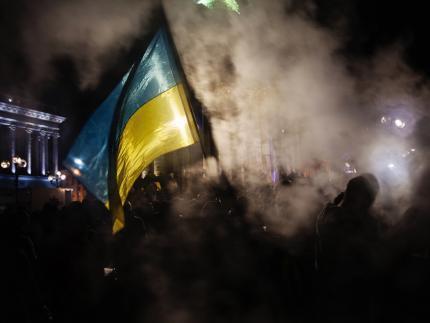
Ukraine needs 60–100 billion euros in investment in the next 10 years in order to rebuild its economy and reach the GDP level it had in 2013, according to Gunter Deuber, an analyst at Vienna’s Raiffeisen Bank International. One half will have to come from the European Union and the United States; the other half from private investors.
The numbers look fantastically large, but they’re not. The United States and the EU have provided Afghanistan with about 100 billion euros worth of aid in the last 10 years, while the USA has invested at least 60–70 billion euros in Iraq. Romania has received 20 billion euros from the EU, while Poland has received 80 billion. Although the costs of rebuilding Ukraine are, as Deuber says, “substantial,” the implied economic transformation is “plausible.” The same holds true for the necessary 30–50 billion of private investments, which are “not utopian.” The bottom line is that the EU “has a vital interest in the success of Ukraine’s economic modernization,” as the risk-filled alternative would be “mass emigration and political radicalization.”
The catch, according to Deuber, is that several preconditions be met.
Ukraine needs to have a “functioning economic model that entails deep reforms and cooperation with the EU and the Eurasian Economic Union” led by Russia.
Ukraine must fulfill all IMF requirements, as only that will persuade skittish European investors to sink their money into the Ukrainian economy.
Ukraine must reduce corruption and makes its institutions capable of productively absorbing incoming monies.
Ukraine needs to adopt a market mentality.
Ukraine needs to stabilize its security situation and deal with the Donbas.
With respect to point 1, Russian President Vladimir Putin can block, and has blocked, Ukraine’s economic relations with the Eurasian Economic Union, but the EU is not without leverage, especially with regard to Russian energy exports, and could probably work out a deal that promotes everybody’s economic interests. Kyiv seems committed to points 2 and 3. The IMF looks happy with Ukraine’s progress, but the problem is that long-term austerity risks producing social discontent and weakening Kyiv’s resolve. With respect to corruption, so far, so good—sort of. Kyiv is cracking down on some forms of low-to-high-level corruption and has recently appointed a young, and presumably incorruptible, head of an anticorruption bureau. As to point 4, my sense is that most Ukrainians have actually assimilated a market-oriented approach to life, if only because they’ve been forced to do so.
That leaves point 5, where Ukraine appears to be completely hostage to Russia. The conventional wisdom is that the war will continue as long as Putin wants it to continue, and the Donbas will remain a cancer as long as Putin wants it to be one. Technically, that’s true. At the same time, the war will stop, if not formally end, when Ukraine has the military wherewithal to stop any Russian or proxy attack short of an all-out invasion or nuclear assault. In fact, Ukraine is close to achieving that capability and, with every day, comes closer.
Moreover, the West and Ukraine can take the initiative and mold conditions in their favor.
The West can decrease the likelihood of an escalation by making it very clear to Putin that the costs of such a move will be very high: exclusion of Russian from the SWIFT international banking system and the massive provision of lethal weapons to Ukraine. In the meantime, providing non-lethal equipment, intelligence data, and training can only bolster Ukraine without in any way alarming Russia or its apologists in the West.
Kyiv, meanwhile, can hasten the Donbas enclave’s transformation into a “frozen conflict” by renouncing the liberation of the region by military means. Yes, that also means renouncing the Donbas enclave, but, as I have argued before, that can only benefit Ukraine and its reform prospects.
Deuber expresses the same sentiment in the circumspect language of economists:
It is worth considering from the economic point of view whether deep reforms as well as a sustainable reconstruction would not be easier to achieve without the Donbas. This would be especially true if [Ukraine’s] relations with Russia do not improve markedly, Ukraine’s orientation on the West continues, and if a cooperative “economic model” with the EEU is not realized.
If you’re still unpersuaded, ask yourself this: Would you invest in the Donbas enclave? And if you would, might I interest you in the Brooklyn Bridge?
OG Image: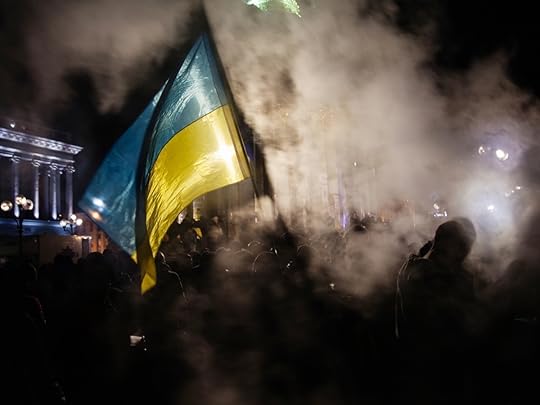 Europe and Central AsiaUkraineUnited StatesEuropean UnionRussiaEconomic RecoveryUkraine Conflict
Europe and Central AsiaUkraineUnited StatesEuropean UnionRussiaEconomic RecoveryUkraine Conflict
April 17, 2015
Ukraine’s Chess Champion—and Putin

You may not be aware of the fact that the women’s world chess champion is now a 22-year-old Ukrainian, Mariya Muzychuk. A native of Stryi, in the western province of Lviv, Muzychuk won the title on April 5th, after defeating Russia’s Natalia Pogonina in a four-game match. The victory garnered Muzychuk the title of Grandmaster, the highest designation in the world of chess.
Muzychuk’s victory is consistent with Ukraine’s long tradition of excellent chess players. One of the world’s current best male players is Vasyl Ivanchuk, also a western Ukrainian. Ukraine also has a long tradition of excellent mathematicians. Small wonder, perhaps, that Ukraine boasts some of the world’s best IT specialists and hackers and is a leader in pirated technologies. When Ukraine’s economic growth resumes in 2016, keep your eye on the IT sector, which is likely to attract substantial foreign investment and serve as a motor for the emerging post-industrial Ukrainian economy.
But back to Muzychuk—and Putin.
Albert Silver of Chess News nicely described the atmosphere at the final game of the Muzychuk-Pogonina match:
In the last game of the match, Natalia Pogonina needed a win at all costs, and the question was whether Mrs. Comeback herself would be able to pull off a fourth miracle in the tournament. Unfortunately, the task was made all the harder as she had Black, and White only needed a draw, and Muzychuk pretty much shut down Natalia in the game. At the end, a new champion was crowned.
Pogonina certainly understood how desperate her situation was, and the opening had to have had silent cries of dismay echoing inside her head. Mariya Muzychuk’s decision to play the Scotch Four Knights caught her off guard, and possibly afraid of her preparation to boot, Pogonina opted for a strange sequence 5...Bc5 and then 6...Bb4, giving up a tempo in order to force Mariya out of whatever it was she had planned. It certainly worked, but at what cost?
The opening was completely in favor of White, and though she was never quite teetering on the edge of victory, nor was she ever in any kind of trouble.
Or was Silver really writing about Russia’s geopolitical chess player, Vladimir Putin?
Just look at poor Vlad. He needs a win at all costs, but the question is whether Russia’s Comeback Kid can pull off another miracle in the Donbas, where Ukraine needs a draw in order to win. Putin certainly seems to understand how desperate his situation is, and his many moves have produced silent cries of dismay in many heads. His invasion of the Crimea and the Donbas has certainly worked, but at what cost? And while Russia is never quite teetering on the edge of victory, Ukraine doesn’t seem to be in any kind of trouble.
I had written an article last summer about Putin and the war with Ukraine in which I described his predicament as resembling Zugzwang—a chess term denoting a condition in which any move a player makes worsens his position. My point was that Putin had boxed himself in by making the policy equivalent of several awful chess moves. Think of his Crimean invasion as a Rook for pawn sacrifice that did nothing to promote Russia’s interests. Think of the Donbas invasion as a Queen for pawn sacrifice that positively harmed Russia’s position. At the rate Putin is going, his side of the chess board will soon consist only of the King, who, to mix metaphors, will be shown to be quite naked.
What do smart chess players do when they know they’re losing? Well, they resign and ask for a rematch. And if they do get to play again, they avoid the mistakes that got them into trouble the first time. For Putin that would mean ending the bloodshed and rethinking the whole point of the Russian invasion of Ukraine. A smart Putin would conclude that there are infinitely better, easier, cheaper, and less destructive ways of promoting pro-Russian tendencies in Ukraine than violence, war, and threats of nuclear Armageddon.
In contrast, a stupid Putin would lose his cool, smash the chess board, send the pieces flying—and start a massive war, as almost everyone expects him to do. With what result? Thousands of Russians and Ukrainians will die unnecessary deaths. And they will continue to do so until the Kremlin’s geopolitical tyro realizes that chess is best played with brains and not brawn.
OG Image: Europe and Central AsiaRussiaUkraineVladimir PutinUkraine Crisis
Europe and Central AsiaRussiaUkraineVladimir PutinUkraine Crisis
April 10, 2015
Meet Motorola, Self-Confessed War Criminal of the Donbas
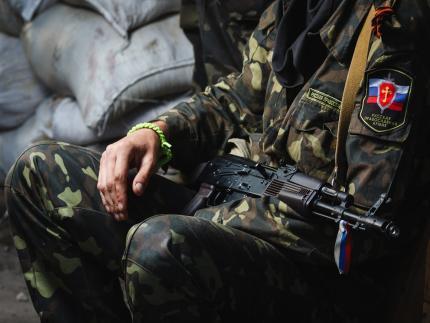
The latest entry into the Donbas enclave’s Pantheon of heroes is one Arsenii Sergeevich Pavlov, a slight 32 year-old Russian from Russia who sports the nom de guerre, Motorola.
Why Pavlov chose this ridiculous moniker is unclear. Was his first cell phone a Motorola? Is he even aware that Motorola was a telecommunications firm founded in a country he detests almost as much as Ukraine—America?
The Russian Spring website, which serves as a cheerleader for Putin’s separatist commandoes in Ukraine’s Russian-occupied territories, refers to Pavlov as “legendary.” And indeed he is. The guy’s fought in all the major battles in eastern Ukraine and earned a name for himself as the commander of the Sparta battalion.
He’s also a self-declared war criminal.
Here’s what Motorola told the Kyiv Post on April 3 after being asked to comment on eyewitness testimony that he had murdered a Ukrainian prisoner of war on January 21:
I don’t give a f**** about what I am accused of, believe it or not. I shot 15 prisoners dead. I don’t give a f****. No comment. I kill if I want to. I don’t if I don’t.
Ukrainian human rights activists were outraged. As was Amnesty International’s Europe and Central Asia Deputy Director Denis Krivosheev, who asked: “The new evidence of these summary killings confirms what we have suspected for a long time. The question now is: what are the separatist leaders going to do about it?”
Krivosheev is missing the point.
Criminality is at the very core of the separatist movement in eastern Ukraine. The separatist leaders are not just not going to do anything about it. They positively need criminality in order to be who they are. Criminality is their raison d’etre. To Motorola’s credit, he was open and honest about it. You can accuse Pavlov of many things, but pussyfootin’ ain’t one of them.
Remember: these are the guys who’ve managed, in just under a year, to bring about a humanitarian catastrophe in the Donbas enclave. These are the guys who are actively involved in stripping the region of its few remaining assets. These are the guys who shot down a Malaysian airliner last summer. These are the guys who are threatening to bring more destruction to Ukraine.
True separatists would be actively building—a nation, a state, whatever. All these guys do is actively destroy.
But that should come as no surprise to anyone who knows they’re Putin’s puppets. After all, Herr Putin is Russia’s dictator. He’s the man who transformed a potential democracy into a full-fledged fascist state. He’s the man who promotes hate with his vast propaganda machine. He’s the man who’s managed to persuade some 85 percent of Russians that war is peace, hate is love, democracy is fascism, and fascism is democracy. If that sounds like George Orwell’s 1984, that’s because it is. No, wait: it’s more like Adolf Hitler’s 1939.
The Donbas enclave that the Motorolas of Russia have invaded is just an outgrowth of Putin Russia proper—a thuggish little protectorate that like, Ramzan Kadyrov’s Chechnya, serves as model of Putin’s regime style.
Putin, after all, has been a man of violence and criminality all his life. The KGB was his natural home, and fascism is his natural worldview. Motorola is just Putin writ small.
The problem for Ukraine is that there are thousands of crazed Motorolas running around the Donbas enclave and many thousands more in Russia, willing and able to pick up the killing. Worse, there are probably hundreds of thousands of enclave residents who think Motorola’s a great guy.
Does Ukraine really want to reintegrate a territory awash with fascist thugs and their morally obtuse collaborators? Cut them loose, I say. Renounce the enclave, build a deep moat, and surround it with the Great Wall of China.
You can’t build a decent country with war criminals.
OG Image: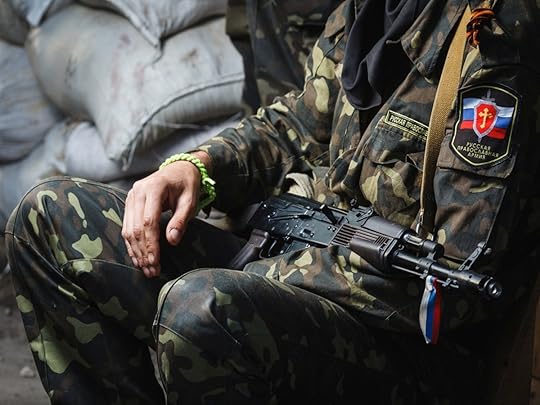 Europe and Central AsiaRussiaVladimir PutinWar Crimes
Europe and Central AsiaRussiaVladimir PutinWar Crimes
April 2, 2015
Russia Expected to Escalate War in Ukraine Soon
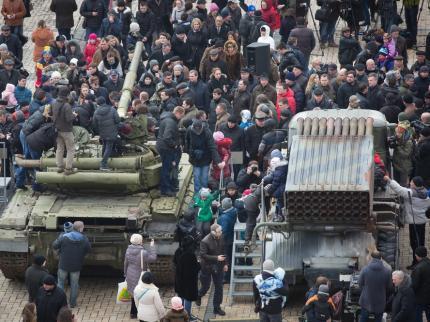
That’s what a number of prominent experts think. Andrii Parubii, the vice speaker of Ukraine’s Parliament and former national security adviser, stated on March 27th that there is a “high risk” of a “full-scale military operation” in the next few weeks. An expert team led by Wesley Clark, a retired US Army general and former NATO supreme allied commander, informed the Atlantic Council in Washington on March 30th that “Ukrainian forces expect [an] attack within the next 60 days. This assessment is based on geographic imperatives, the ongoing pattern of Russian activity, and an analysis of Russian actions, statements, and Putin’s psychology to date.” Finally, Russia’ premier military analyst, Pavel Felgenhauer, said on March 31st that the next “Russian offensive campaign” is “highly likely to begin soon.”
Heightened fears of major Russian escalations—up to and including air strikes and a massive land assault—have occurred every one-to-two months since Russia’s invasion of Crimea in February 2014. Russia has confounded these expectations by escalating slowly, steadily increasing its supply of arms, money, irregular forces, and regular troops—while always stopping short of a full-scale war.
No one knows why. Has Vladimir Putin been skittish about the risks involved? Did he just make a mistake and fail to seize the best opportunity to attack—i.e., anytime in the first few months after the Maidan Revolution? Or has he been developing fiendishly clever plans and sharpening his knives?
To launch a truly big war now would be a huge strategic mistake for Russia. Ukraine has a functioning government, police force, and army, and the latter has shown that it can dole out serious punishment to Putin’s commandoes in eastern Ukraine. According to official Ukrainian sources, the Russian separatists have lost 14,600 men since the spring of last year. In comparison, Ukraine’s armed forces incurred 1,232 deaths in 2014 and 2015. (If the number were to include soldiers who are missing in action, and probably dead, it would probably be 2,500–3,000.) That’s a kill ratio of 1:4 or 1:5 in Ukraine’s favor. The kill ratio in the Battle of Debaltseve, in mid-January, was similar, putting the lie to the claim that it was a rout for Ukraine.
Russia has more soldiers and better equipment and it could defeat Ukraine in a massive land war, but the cost to Russia would be extremely high, especially as victory on the battlefield would not immediately translate into control of the country. Ukraine has a vast volunteer movement, an active civil society, a newly found sense of national solidarity, while Ukraine’s population overwhelmingly supports Ukraine’s territorial integrity and sovereignty. Resistance would be fierce, and a Russian occupation could easily turn into a strategic defeat.
As Felgenhauer argues: “There will in all likelihood be no drive toward Kyiv or Lviv, up to the Polish boundary. It won’t happen because Russia lacks the forces. In order to occupy Ukraine and place 45 million people on their knees, it is necessary to have many human resources and the army should consist of no fewer than a million. Seizing Kyiv is much easier than controlling it … We don’t have the capacity.”
Worse for Russia, a major escalation in the next few months would torpedo Moscow’s carefully calibrated attempts to split the European Union and convince Brussels to drop its sanctions. War—and the certainty of thousands of civilian deaths and hundreds of thousands of refugees fleeing westward—would consolidate the Europeans and probably lead to an intensification of sanctions. Even the Obama administration would feel impelled finally to arm Ukraine with lethal weapons, as the only argument against provisions—that they would provoke an escalation—would fall away in the face of Putin’s unprovoked escalation. Stephen Cohen, North Korea, Marie Le Pen, and Germany’s Russlandversteher might cheer Putin’s aggression, but that would be small consolation for the Kremlin.
Still, Putin just might be irrational—or ill—enough to do something profoundly stupid and inhuman. Power-hungry dictators presiding over crumbling regimes and fearful of their own physical decay have been known to sacrifice millions for the sake of their manias.
The West must understand that Ukrainians will fight and that Putin’s war, if he launches it, will not be a cakewalk for Russia. Ukraine and Russia could be destabilized. If they are, Europe will be next. The EU’s favorite mantra—that there is no military solution to the war—can come to pass only if Ukraine has the capacity to stop a Russian assault. And that means provisions of lethal weapons.
Here’s what the Clark team recommends:
1. strategic imagery and other electronic/communications intelligence detailed and timely enough to be able to provide warning of an impending attack;
2. long-range, mobile anti-armor systems, as well as the shorter ranger Javelin system, both equipped with thermal imagery;
3. secure tactical communications down to vehicle level;
4. long-range, modern counter battery radars able to detect firing positions for long range rockets;
5. sniper rifles with thermal or night vision sights for counter sniper teams;
6. modern intelligence collection and EW [electronic warfare] systems effective against Russian digital communications; and
7. whatever counter UAV [unmanned aerial vehicle] systems can be made available on a near-term basis.
Most important, the West must act immediately. “At the minimum,” concludes Clark, “a palletized, emergency assistance package consisting of as much of the lethal components as possible should be assembled and pre-deployed for strategic airlift upon commencement of the Russian offensive.”
As the Romans said, “If you want peace, prepare for war.”
OG Image:
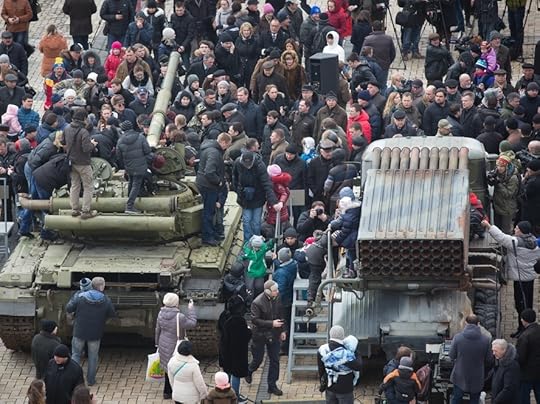 Europe and Central AsiaRussiaRussianUkraineUSNATOVladimir Putin
Europe and Central AsiaRussiaRussianUkraineUSNATOVladimir Putin
March 31, 2015
Ukraine as a Vital Security Interest for Europe
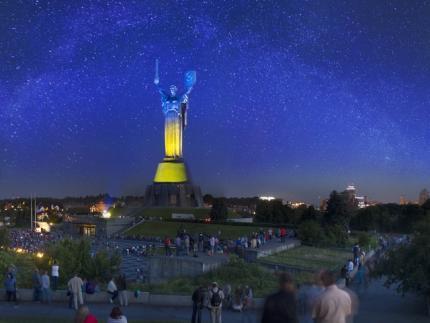
An American official in Brussels recently informed me of a meeting he had with a highly placed European Union diplomat during which the latter “stressed that Ukraine is an ‘almost existential’ issue for Europe.”
The phrase “almost existential” is worth looking at more closely. Existential issues concern the life or death of the subject concerned. A Russian attack on Germany would be an existential issue for Germany. A Russian attack on Tajikistan would be an existential issue for Tajikistan, but a non-existential issue for Germany. An almost existential issue for some country is thus something that almost concerns—or is almost equivalent to—the life and death of that country. Seen in this light, the claim that Ukraine is almost existential for Europe amounts to saying that Ukraine’s life or death is almost equivalent to the life or death of Europe.
Another way of making this point is to say that Ukraine is a vital strategic interest of the West. That is, Ukraine isn’t just an interest to Europe: lots of countries are. Nor is it just strategic: something on which the well-being, security, and survival of Europe depend. Ukraine is also vital: the well-being, security, and survival of Europe depend on it directly.
These are very strong words. They’ll come as no surprise to Ukrainian policymakers and analysts, who’ve been making just this point for at least a year—if not since Ukraine’s independence in 1991—to no avail. Although the United States and the United Kingdom supposedly guaranteed Ukraine’s security in the 1994 Budapest Memorandum on Security Assurances, no Western country paid much attention to Ukraine or its security for more than two decades. Quite the contrary, the EU and NATO expanded all the way up to Ukraine’s borders and few Western policymakers considered what that meant for Ukraine: its relegation to a security no-man’s-land between a visibly indifferent West and a visibly aggressive Russia.
Had Europe recognized Ukraine’s almost existential importance one or two decades earlier, Russia might not have invaded Crimea and the Donbas and the human tragedy of the ongoing Russo-Ukrainian war could have been avoided. Put this way, Europe’s very belated understanding of its own vital strategic interests is a terrible indictment of its self-absorption, hypocrisy, and inefficiency. Clearly, Ukraine has to reform itself radically. But so, too, does the EU.
One Western analyst has recognized Ukraine’s strategic importance from the get-go: the former national security adviser Zbigniew Brzezinski, who’s consistently argued that the only thing standing between Russia and empire is an independent Ukraine. Just recently, Brzezinski expanded on these sentiments in an interview with Poland’s Gazeta Prawna:
If the war in Ukraine turns into an easy military success for Russia, its victory, then we must reckon with something in the Baltic states. That would be the first step. Further flare-ups could take place in Moldova, Georgia, and Azerbaijan. That would be the logic of events. Next in line could be Poland.
When asked whether NATO would defend Poland, Brzezinski offered sobering advice. “Poland should arm itself,” he said. The complexity of NATO procedures mean that the alliance “could be paralyzed for some time” after a Russian attack on Poland, which “should count on itself so as to be able to defend itself for as long as possible.” These are scary recommendations for a country that’s been partitioned four times in modern history.
Sadly, Brzezinski is right about NATO’s inability to rush to the rescue even of its own members—not to mention such non-members as Ukraine. But his comments also suggest that Europe’s perception of Ukraine’s “almost existential” importance still has some way to go before it becomes more than a rhetorical claim. As Russian analyst Vladimir Ryzhkov says:
The West’s reaction [to Putin’s aggression] was not only weak, but is growing weaker by the day. It only reluctantly and belatedly imposed sanctions, without imposing an oil or gas embargo or disconnecting Russia from the SWIFT banking system—moves that would have threatened the survival of Putin’s regime. What’s more, after less than a year of sanctions, a growing number of Western states are already clamoring to weaken or repeal them.
Europe will truly understand the meaning of “almost existential” when it appreciates that its commitment to Ukraine must be “almost” as great as its commitment to itself.
OG Image: Europe and Central AsiaUkraineEurope
Europe and Central AsiaUkraineEurope
March 23, 2015
Is There Economic Reform in Ukraine?
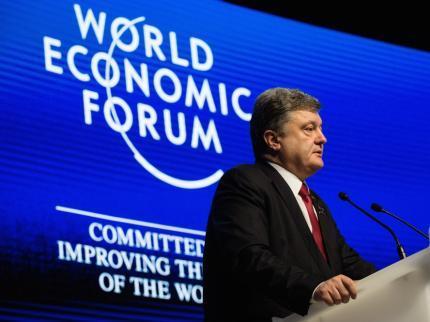
If you listen to Ukrainians tell it, there’s been absolutely no reform within the last year. Their frustration is understandable—they want the positive effects of major change now—but their perception just doesn’t correspond to the facts.
The much awaited reform process is actually under way—though quietly and unobtrusively. The Education Ministry and the Ministry of Internal Affairs have led the way with restructuring universities and the police force, probably because they don’t deal directly with high-stakes corruption and the power of the oligarchs. Some personnel cuts have been introduced in the presidential administration and the government bureaucracy; more are forecast. A law (albeit flawed) on lustration has been adopted and has already led to some high-level resignations and prosecutions. An Anti-Corruption Bureau has been approved, and a head is currently being sought.
Perhaps most important, economic reform is a reality. According to the invaluable VoxUkraine Index for Monitoring Reforms, compiled by Tymofiy Mylovanov, an economist at the University of Pittsburgh, and a team of economists with specialized knowledge of Ukraine, the level of Ukraine’s economic reform efforts—when measured on a –5 to +5 scale, with the +2–3 range being “acceptable”—is moving in the right direction. (The index measures the quality of reform measures adopted in a two-week period, and not the overall progress of reform.) Here are Ukraine’s scores for 2015:
January 11th: 1.1
January 25th: 1.3
February 8th: 1.5
February 22nd: 0.3
March 8th: 2.2
If you discount the February 22nd score as an outlier, then the trend is clearly upward. More important than the overall score are the individual components for these five dates and the averages of the five scores (in parentheses):
Governance and anticorruption: 0.9, 1.8, 2.0, 1.0, 2.9 (1.72)
Public finance: 1.0, 1.5, 2.0, 0.0, 2.0 (1.3)
Monetary policy and financial markets: 0.8, 1.0, 2.5, 0.0, 3.0 (1.46)
Energy independence: 2.0, 1.0, 0.8, 0.0, 3.0 (1.36)
Foreign trade: 0.6, 1.0, 0.0, 0.5, 0.0 (0.42)
The foreign trade sector is obviously unreformed—with an average of 0.42—but all the others have decent, though not yet acceptable, average scores. If the February 22nd scores are excluded—for the simple reason that almost no legislation was adopted in that two-week period—then the overall trend for the individual category scores is very clearly upward and the four-score averages (in parentheses) look very different:
Governance and anticorruption: 0.9, 1.8, 2.0, 2.9 (1.9)
Public finance: 1.0, 1.5, 2.0, 2.0 (1.63)
Monetary policy and financial markets: 0.8, 1.0, 2.5, 3.0 (1.83)
Energy independence: 2.0, 1.0, 0.8, 3.0 (1.7)
Foreign trade: 0.6, 1.0, 0.0, 0.0 (0.4)
The averages for the first four categories are almost acceptable, being just beneath 2.0, but the last two individual scores for Governance and anticorruption, public finance, and monetary policy and financial markets are already acceptable, being, respectively, 2.0/2.9, 2.0/2.0, and 2.5/3.0.
Naturally, Ukraine still has a long way to go. But reform has begun, and if Kyiv sustains its political will, the West continues to insist on change, and Vladimir Putin continues to remind Ukraine that the alternative to reform is subjugation to Russia—then 2015 may be the year of reform in Ukraine. Perhaps that’s why the IMF’s permanent representative in Ukraine, Jerome Vacher, stated on March 19th that the IMF expects economic growth to resume in late 2015 and to constitute 2 percent in 2016—nothing to write home about, but significantly better than the 5.5 percent drop expected in 2015.
OG Image: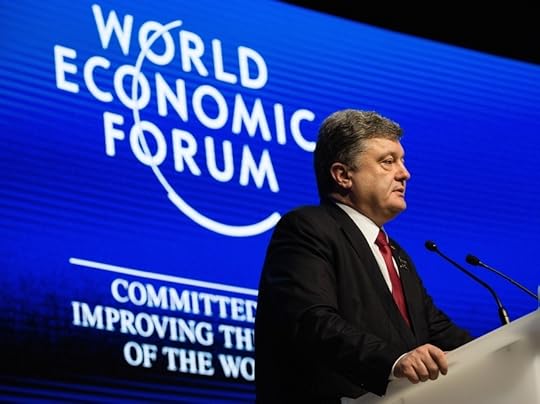 Europe and Central AsiaUkraineRussiaEUReformEconomicEuromaiden
Europe and Central AsiaUkraineRussiaEUReformEconomicEuromaiden
March 17, 2015
The Decline of the Russian Empire
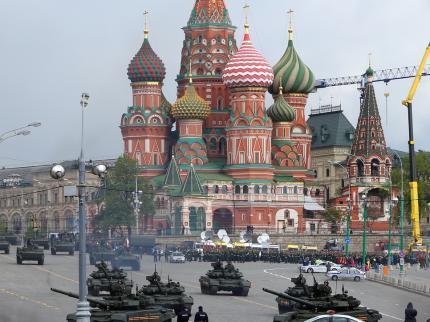
The following is an interview with Rein Taagepera, professor emeritus of the University of Tartu, in Estonia, and the University of California, Irvine.
***
MOTYL: Professor Taagepera, you were the first social scientist to have studied the rise and fall of empires in a rigorous social-scientific manner. So let’s start with a big-picture question. Why do empires decay?
TAAGEPERA: Empires rarely stand still. They initially outrun their internal flaws through external expansion. Once they stop growing, these flaws accumulate. Expansion is self-reinforcing, and so is decay. To change course, one must give up on past glory and start anew.
MOTYL: How do empires react to decay?
TAAGEPERA: It is psychologically easier to give up on overseas holdings than on territorially contiguous ones, however disparate these may be ethnically. While losing vigor, Poland-Lithuania and Austria-Hungary largely maintained their territory, until their final collapse. In contrast, the Ottoman Empire began to lose ground slowly already in the 1700s.
When one compares Russia with these three, the Ottoman trajectory appears most similar. Both Russia and Turkey held huge territories, some densely populated, some almost empty. Early area loss was fitful. It involved some of the most densely populated parts, with Turkey losing the Balkans and Egypt, and Russia losing the East European satellite states and the former Soviet republics. Prior to final collapse, Turkey was reduced to an ethnic core area, the Fertile Crescent, and the (pre-petroleum) wastelands of the Arabian Peninsula. At present, Russia consists of its ethnic core area, the Caucasus, and the wastelands of Siberia. Both Turkey and Russia fell far behind other world powers in economic development.
MOTYL: So are you predicting the Russia’s collapse?
TAAGEPERA: It would be risky to conclude that a Russian collapse is imminent. Under Kemal Ataturk, Turkey gave up on empire and focused on building a new nation state. This flip was easier for Turkey than it would be for Russia. Ataturk could shift from Islam to ethnic Turkish pride. Post-Soviet Russian leaders had no such alternative, because language-based nationalism was at the very core of the empire ever since Moscow’s “in-gathering of Russian lands.”
Charles de Gaulle may offer a more feasible script for Russia’s emancipation from its past. He understood that, in the present world, colonies are a burden. But he dealt with overseas colonies. France had a tough time letting go of Algeria, while contiguity makes it harder for Russia to forget about Ukraine, not to mention the Northern Caucasus and Tatarstan. Russia is still waiting for such a visionary leader.
MOTYL: Do you see Russia succeeding in its quest for imperial revival?
TAAGEPERA: History rarely shows empires that stumble but rise again. The Egyptian, Assyrian, and Hittite repeat-empires were new formations that emerged long after the breakdown of the empires that preceded them. The French colonial empire comes closest to a second-breath empire. Kicked out of Canada and India, France built up a new empire in Africa. Today’s Russia lacks such an option. Trying to recoup its habitual sphere of domination only wastes resources that should go into starting anew.
MOTYL: While Russia’s imperial collapse may not be imminent, it does seem inevitable. What should the West do about it?
TAAGEPERA: As with the Ottoman Empire, no external power wishes Russia to collapse: The result would be too messy and unpredictable. Yet what Putin sees as his “near abroad” is slipping away thanks to the attractiveness of Western prosperity and the unattractiveness of the Russian model. Putin sees this as a dastardly Western plot: Given his imperial mindset, he cannot imagine Ukraine as having a mind of its own. One can understand Russia’s frustration. Putin genuinely feels on the defensive. Yet, by clumsily trying to strike back, Russia is creating a defensive circle around itself.
Aggression must be contained, even when launched by understandably frustrated people. When facing a decaying rather than an expanding empire, however, one can afford a more elastic response. The decaying empire has limited capability. Containment needs little active use of force. It’s enough for the West to refuse to recognize conquests and to reinforce its defenses elsewhere, while waiting for the empire either to reform or to crumble.
Russia is a socioeconomically decaying society, still mired in nostalgia, but still capable of plenty of mischief. It is up to Russia to free itself from the chains of imperial history. This will take time—generations—unless speeded up by some de Gaulle. Meanwhile, the tension has to be managed.
MOTYL: And if it’s not managed?
TAAGEPERA: International systems may become unstable when an emerging power demands a larger slice of the pie or when an existing empire undergoes decay. When both scenarios take place simultaneously, the system gets doubly unstable. The alliance of an ascending Germany with a decaying Austria led to World War I, because it encouraged Austria to attack Serbia, while Russia’s response to Austria drew in Germany. The tail wagged the dog. The present marriage of convenience between an ascending China with a decaying Russia carries similar risks. It seems far-fetched to imagine that, in trying to win leverage against the West, Russia could draw in China, but Austria’s drawing in Germany also looked far-fetched in the spring of 1914.
OG Image: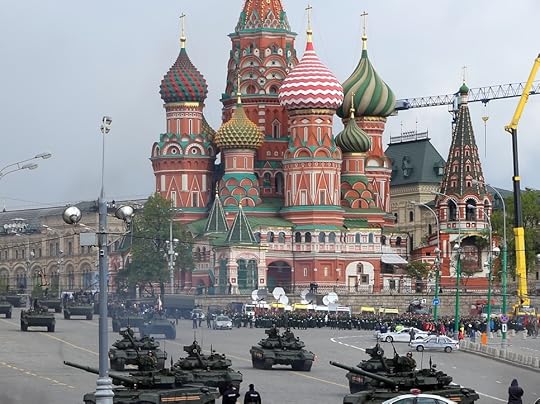 Europe and Central AsiaRussiaVladimir PutinEmpireMinsk AgreementRussian AgressionTurkey
Europe and Central AsiaRussiaVladimir PutinEmpireMinsk AgreementRussian AgressionTurkey
March 10, 2015
Ukrainian Jewish Leader on Russian Aggression
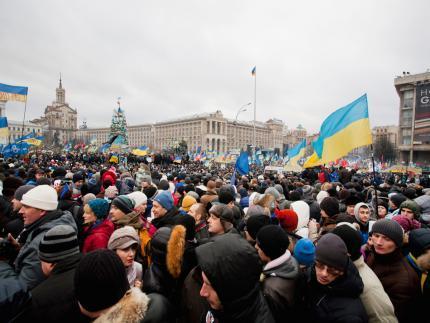
Josef Zissels is the chairman of the General Council of the Euro-Asian Jewish Congress. He is sitting in the middle of a long table in the Ukrainian Restaurant in downtown New York. Before him is a bowl of borscht. As he eats, he shares his views of the current crisis in Ukraine with nine specialists and activists.
Zissels does not mince words. “There is no civil war in Ukraine,” he says. “There is a Russian aggression supported by local collaborators.” The war with Russia will be “long,” and Ukraine needs to construct a “militarist economy” like Israel’s. The Maidan Revolution had nothing to do with ethnicity, language, or religion. It was a “civilizational conflict” between those Ukrainians who supported Europe and those who supported Russia.
Zissels is 69-year-old former dissident with prison sentences to prove it. Born in Tashkent, the capital of Uzbekistan, he’s a staunch Ukrainian patriot who speaks perfect Ukrainian. In 1947, his family moved to Chernivtsi, in then-Soviet Ukraine, where he studied at the university. His dissident activity in both the Jewish and democratic movements began in the 1970s; in 1978, he joined the Ukrainian Helsinki Group. That same year, he received his first three-year prison sentence. In 1984, he got three more years. In 1989, as Mikhail Gorbachev’s perestroika was taking off, he became co-chairman of the VAAD—the Confederation of Jewish Organizations and Communities. Two years later, in 1991, Zissels became chairman of the Association of Jewish Organizations and Communities of Ukraine and executive vice president of the Congress of National Communities of Ukraine and the Jewish Confederation of Ukraine.
As a Jewish Ukrainian democrat, Zissels took part in and supported both the 2004 Orange Revolution and the 2013–14 Maidan Revolution. On December 15, 2013, he delivered a stirring speech to the protesters on Kyiv’s Independence Square:
In 2004 I stood here, at this very Independence Square, this very Maidan, at the stage which had been built here, and thought of how happy my fate is. … Today the situation in Ukraine is very similar to 2004, for once more the same propaganda is being used against Euromaidan, against the united opposition, against all of us. They are trying to sow the seeds of conflict, to pit us one against the other, and to create an artificial standoff—national minorities against Ukrainians. But Ukraine and its people have changed in these years, in this short time. … When we go out to the Maidan desiring freedom, we have one joint goal: a united dignified future. … We need a new government…. Until we have such a government, we have only one peaceful weapon: these Maidans, which can grow into an all-national Maidan, into a perpetual campaign of civil dissent. Three thousand years ago my people took 40 years to walk from slavery to freedom. We, the people of Ukraine, have already gone halfway. There is not much longer to go!
Zissels ended his peroration with two explosive lines—the first from Ukraine’s national poet, Taras Shevchenko: “If you fight, you shall win!”—and the second from the Ukrainian nationalist movement: “Glory to Ukraine!”
Zissels identifies himself completely with his homeland, Ukraine, which he sees as slowly overcoming centuries of Russian servitude and becoming a liberal, democratic country. His is the language of the 20th century’s Ukrainian national liberation movements. Who, he asks, will “expel the Russian disease from our land?” Right-wing Ukrainians have, he says, mostly abandoned their Judeophobia and homophobia. They’ve still retained their Russophobia, but that’s “largely justified.”
Asked about the controversial Azov volunteer regiment, whose leader is a neo-Nazi, Zissels brushes off the implication that the entire unit shares his extremist views. Perhaps 30 or 40 do, he says, but the important thing is that all the volunteers, including the Jews fighting in Azov, are on the front lines. Their ideological predilections don’t matter, he emphasizes, as they’re all united in defending their country against Russia.
In a July 6, 2014, interview in Toronto, Zissels openly associated himself with the controversial term zhydobandera, which the Ukrainian Jewish oligarch Igor Kolomoisky popularized by wearing on a T-shirt. (The term is a conjunction of zhyd, a word that can mean both “Jew” and “kike,” and the surname of Stepan Bandera, a Ukrainian nationalist, that according to Soviet and Russian propaganda was a synonym for fascist. Hence, zhydobandera is the equivalent of both “Jew-Ukrainian nationalist” and “kike-fascist.”) According to Zissels, “Back in 1978 when they were imprisoning me, the KGB couldn’t understand me: ‘as a Jew he should be a Zionist.’ They had these stereotypes, but I became part of the Ukrainian Helsinki Group, a Ukrainian national group, and therefore back then I was already a zhydobandera.”
Zissels is in the United States, meeting with Jewish, Ukrainian, and US government circles in order to lobby for his country. Putin, he notes, will stop at nothing, and will be willing to sacrifice untold numbers of his own people in order to crush Ukraine, which “opened a Pandora’s box that will be hard to close.” Ukraine, he stresses several times, needs weapons in order to defend itself against the Russian aggression. “This disease,” he says, “must be stopped.”
OG Image: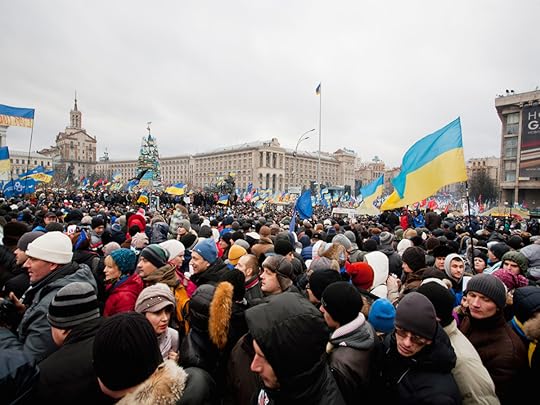 Europe and Central AsiaUkraineEuromaiden
Europe and Central AsiaUkraineEuromaiden
March 9, 2015
Has Putin Lost Germany?
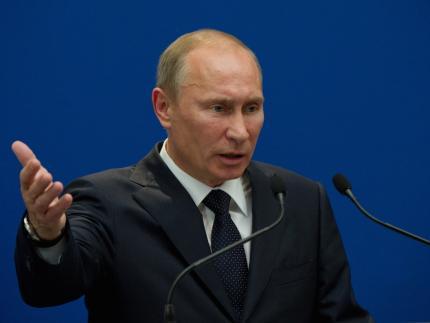
A recently released German documentary about Vladimir Putin—Mensch Putin!—paints a decidedly unflattering picture of Russia’s leader. He is, according to the film, a disturbingly insecure man with a deeply rooted need to compensate for his inadequacies with manifestations of physical prowess and the exercise of power.
“So what else is new?” Putin’s many critics might ask. The answer is: the film is German, produced by none other than the venerable ZDF, or Germany’s equivalent of BBC or PBS. That makes the film a touchstone of changing German attitudes toward Putin. The film updates former Chancellor Gerhard Schröder’s characterization of Putin as a “lupenreiner Demokrat” (“flawless democrat”) to something closer to Russia’s version of Hitler lite. What other German leader was a disturbingly insecure man with a deeply rooted need to compensate for his inadequacies with manifestations of physical prowess and the exercise of power? Germans will get the implied comparison, even if it remains unarticulated in the documentary.
Unsurprisingly, the film has caused an uproar in Germany. A recently established self-styled media watchdog, Die Ständige Publikumskonferenz der öffentlich-rechtlichen Medien (which translates as “The Standing Public Conference on Public-Legal Media”), has formally charged ZDF with misrepresenting the reality by falsely depicting Putin’s residence in Dresden and citing a questionable eyewitness. The group’s head, Maren Müller, is a 54-year-old leftist from Leipzig and its primary target appears to be mainstream reporting that challenges the Kremlin’s worldview.
Contrary to Müller’s charges, Mensch Putin! is a serious piece of investigative reporting. The film draws on intelligence documents and the testimony of a wide range of impressive Russian and Western experts including Masha Gessen, Nina Khrushcheva, Ben Judah, and Erich Schmidt-Eenboom. Its only fault, to my mind, is to fail to identify one of its interviewees, Alexander Dugin, as a Russian fascist.
It’s obvious why Müller is upset. The film contrasts today’s sleek, hyper-masculine, clean-cut Putin with the Putin of the 1980s, when he was a slovenly, heavy-drinking, womanizing, overweight minor Russian spy in Dresden. The entire film is worth watching just to catch a glimpse of two remarkable photographs of a decidedly portly Putin (at 15:35 and 17:11 minutes). A reliable source also states that she knew that Putin regularly beat his wife, Lyudmila—which seems disturbingly credible in light of the film’s suggestion that Putin continually needs to demonstrate his power over others. It’s hard not to conclude that Putin’s war against Ukraine is a form of wife-beating writ large. The man demands submission to his will. Ukraine—often depicted in Soviet and Russian propaganda as a wide-eyed young girl—says no. The result is violence.
Especially interesting is the extraordinary claim that Putin has been the object of five assassination attempts: in London, Moscow, St. Petersburg, Tehran, and Baku, the capital of Azerbaijan. The distribution of cities is revealing. Putin clearly has enemies everywhere, in the West, in Russia, in the non-Russian “near abroad,” and in the rest of the world. Small wonder that his style of politics rests on paranoia, which, in his case at least, is to some degree justified. Was the Boris Nemtsov murder the Putin regime’s latest agonized expression of this paranoia? And will the assassination of Russia’s leading democrat radicalize Putin’s opponents and, in the long tradition of Russian radicalism, move some of them to try a sixth assassination attempt?
Notwithstanding these reports, the most important aspect of the documentary is that it was produced by ZDF, an independent nonprofit station. Until recently, Germany’s political culture—and politics—were distinctly, even embarrassingly, pro-Russian and pro-Putin. But no more. Chancellor Angela Merkel says Putin “lives in another world.” The majority of Germany’s intellectuals and pundits are increasingly critical of Putin and his wars. And the ZDF documentary (as well as another, reportedly in production, that features Putin’s war in Ukraine) demonstrates that, while Putin may have gained the hearts and minds of German leftists, he has lost Germany. And that means that he has lost the European Union.
OG Image: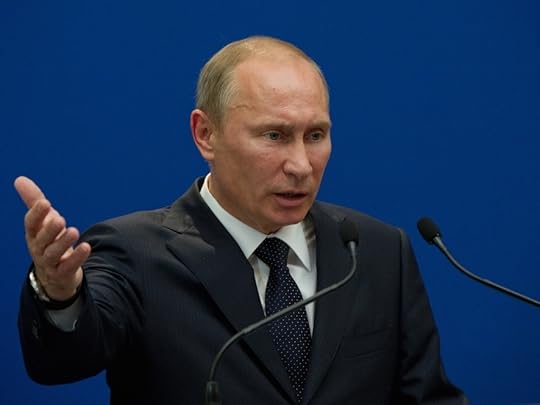 Europe and Central AsiaRussiaGermanyVladimir PutinUkraineEuromaidenCrimeaDonetsk
Europe and Central AsiaRussiaGermanyVladimir PutinUkraineEuromaidenCrimeaDonetsk
February 24, 2015
Why Russia Will Lose in Ukraine
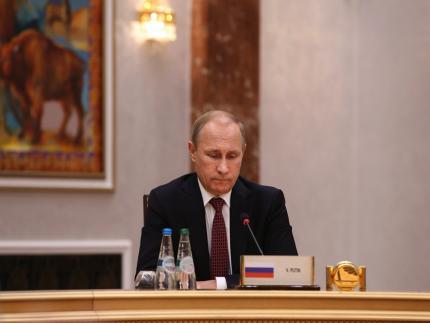
So who’s winning the war in eastern Ukraine—Russia or Ukraine? The answer is not as simple as it might seem, because victory means different things for each side.
A Russian victory could take one of two forms: territorial expansion into large parts of southeastern Ukraine or the imposition on Ukraine of disadvantageous peace terms. Or it could take both forms. But neither has happened, and neither is likely to happen.
Anything short of such a victory amounts to a defeat for Russia. Having destroyed the Russian economy, transformed Russia into a rogue state, and alienated Russia’s allies in the “near abroad,” Vladimir Putin loses if he doesn’t win big.
In contrast, Ukraine wins as long as it does not lose big. If Ukraine can contain the aggression, it will demonstrate that it possesses the will and the military capacity to deter the Kremlin, stop Putin and his proxies, and survive as an independent democratic state.
The balance of forces could change. Russia could throw hundreds of thousands of regular troops against Ukraine in order to seize Kyiv or build a land corridor to Crimea. But this would dramatically increase Putin’s risk factor. In that case, Ukrainians would fight to the finish, a partisan war would ensue, the United States would supply weapons to Ukraine, other Eastern European countries might get involved in the fighting, Western sanctions would be ratcheted up, and Russia would be excluded from the SWIFT international banking system. Russian losses—human, financial, and material—would likely be enormous, inviting a palace coup against Putin.
Although Putin is driven by a bizarre vision of reestablishing Holy Russia’s greatness, he is enough of a realpolitik policymaker to understand that attempting to overrun Ukraine would have dire consequences for Russia and himself.
Putin is therefore likely to maintain the military pressure on Ukraine—having the separatists strike here, strike there, withdraw, regroup, make nice, and then repeat the cycle—in the hope of draining Ukraine’s economic, military, and human resources.
But that, too, won’t result in territorial expansion into large parts of southeastern Ukraine or the imposition on Ukraine of disadvantageous peace terms.
Thus far skittish about military aid, the Obama administration is coming under increasing pressure to provide Ukraine with lethal weapons and real-time intelligence. Provided that meaningful economic reforms move forward in Kyiv, chances are good that other Western states and institutions will give Ukraine significant economic assistance, especially now that the IMF has committed itself to a $40 billion aid package. And the more Western money is sunk into Ukraine, the greater the likelihood that Western states will follow with military aid, if only as a guarantee of their financial investment. Meanwhile, Ukrainian elites—prodded by the West and compelled by Putin’s threat to annihilate Ukraine—will embark on (more or less) radical economic reforms.
The Ukrainian armed forces are getting stronger and more effective by the day, inflicting high casualties on the militants and Russians and maintaining their positions. Even the retreat from the Debaltseve salient, mistakenly portrayed in the Western press as a “debacle,” was anything but. (In order to know that, however, you need to be able to read Ukrainian- and Russian-language sources.) According to one of Ukraine’s top military analysts, Yuri Biryukov, Ukraine’s losses were 179 dead and 89 missing and presumed dead in the period from January 18th to February 18th, while Russian and proxy losses amounted to 868 dead—roughly three to four times as many. And small wonder. As Ukraine’s other top military analyst, Yuri Butusov, has repeatedly argued on his Facebook page, there is simply no comparison between the Ukrainian army of today and the ragtag band of soldiers that was Ukraine’s armed forces in March of 2014, when Putin seized the Crimea. More important, Ukraine’s less than competent military command appears to be on the verge of a major change in personnel.
The situation on the front is a military stalemate that is as deleterious to the Donbas enclave’s economic viability as it is beneficial to Ukraine’s ability to survive as an independent political entity. As this blog has argued ad nauseam, a frozen conflict—which may be in the process of emerging, even though everyone denies it—would be the best thing that could possibly happen to Ukraine.
Finally, although Ukrainians are one-fourth as many as Russians, Ukrainians are fighting for their homeland. In both eastern and western Ukraine, they know this is perhaps their last chance to break free of Moscow’s imperial grip. The remarkable thing about Ukraine’s dedicated volunteer battalions is the high number of eastern Ukrainians in them. Western Ukrainians dominated in both the 2004 Orange Revolution and the 2014 Maidan Revolution. Russian-speaking eastern Ukrainians have demonstrated that, when it comes to defending their own homes, they’re more than willing to step up.
Russia can’t win big. Ukraine can’t lose big. And that means that Russia is losing and Ukraine is winning—and that Russia will lose and Ukraine will win.
The West should know that, in supporting Ukraine, it’s not just doing the right thing. It’s also betting on the winner.
OG Image:
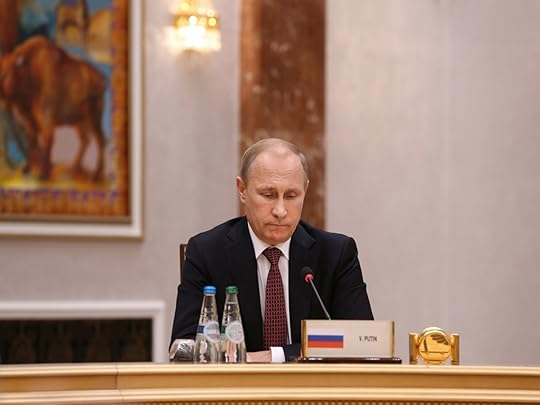 Europe and Central AsiaUkraineRussiaVladimir PutinEuromaiden
Europe and Central AsiaUkraineRussiaVladimir PutinEuromaiden
Alexander J. Motyl's Blog
- Alexander J. Motyl's profile
- 21 followers



